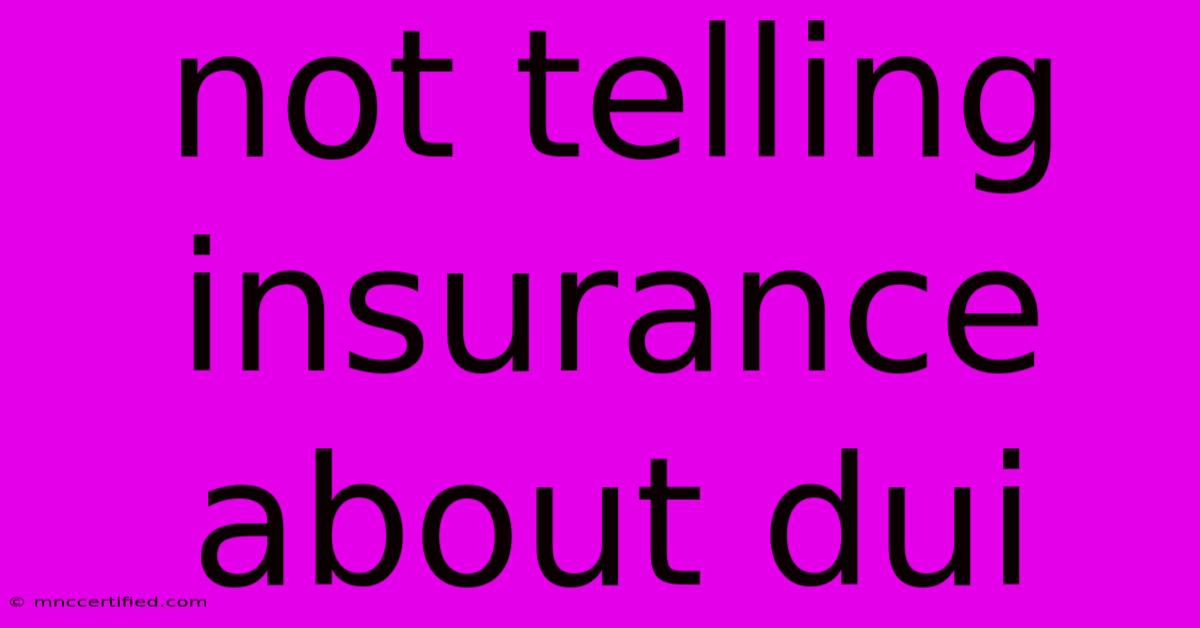Not Telling Insurance About Dui

Table of Contents
The High Stakes of Hiding a DUI from Your Insurance Company
Failing to disclose a DUI to your insurance company is a risky gamble with potentially severe consequences. While the immediate temptation might be to keep quiet, the long-term repercussions far outweigh any perceived short-term benefits. This article explores the legal and financial ramifications of this decision, helping you understand the gravity of the situation and guiding you towards a more responsible course of action.
Understanding the Insurance Contract
Your insurance contract is a legally binding agreement. A crucial part of this agreement involves providing accurate and complete information about your driving record. Withholding information, especially a DUI, is a breach of contract. Insurance companies rely on honest disclosures to accurately assess risk. When you fail to disclose a DUI, you're essentially committing insurance fraud, a serious offense with significant penalties.
Potential Consequences of Non-Disclosure
The consequences of not telling your insurer about a DUI can be devastating:
-
Policy Cancellation: If your insurance company discovers the DUI, they're likely to cancel your policy immediately. This leaves you without coverage, exposing you to significant financial risks in the event of an accident. Driving without insurance is illegal and can result in hefty fines and license suspension.
-
Increased Premiums: Even if your policy isn't canceled, expect significantly higher premiums. DUIs dramatically increase your risk profile, making you a more expensive client for insurance companies. These increased premiums can last for years, even after your DUI is no longer a factor on your record.
-
Future Insurance Difficulties: Securing future insurance coverage will become exponentially more difficult. Many insurance companies will deny you coverage entirely or only offer it at exorbitant rates, significantly impacting your ability to drive legally.
-
Legal Penalties: As mentioned earlier, failing to disclose a DUI is insurance fraud, a crime punishable by hefty fines, jail time, and even a criminal record. This can have severe implications for future employment and other aspects of your life.
-
Civil Lawsuits: If you're involved in an accident after failing to disclose your DUI, you could face civil lawsuits, potentially leading to substantial financial liability. Your insurance company may refuse to cover the damages, leaving you personally responsible.
What to Do if You've Already Hidden a DUI
If you've already failed to disclose a DUI, the best course of action is immediate and honest disclosure. Contact your insurance provider as soon as possible and explain the situation. While the consequences are still likely to be negative, being proactive and honest demonstrates responsibility and might help mitigate the penalties. Remember, continued deception only worsens the situation.
The Importance of Honesty and Transparency
Ultimately, honesty is the best policy when dealing with insurance. While the immediate reaction might be to avoid the consequences, the long-term ramifications of concealing a DUI are far greater. Being upfront and transparent with your insurance company, even if it means facing higher premiums, protects you from far more severe legal and financial consequences. Remember to always comply with all legal requirements after a DUI conviction.
Seeking Legal Advice
It's highly recommended to consult with a legal professional specializing in DUI and insurance law. They can provide personalized guidance on your specific circumstances and help you navigate the complex legal landscape.
This information is for general knowledge and informational purposes only, and does not constitute legal advice. Always consult with qualified professionals for guidance on your individual situation.

Thank you for visiting our website wich cover about Not Telling Insurance About Dui. We hope the information provided has been useful to you. Feel free to contact us if you have any questions or need further assistance. See you next time and dont miss to bookmark.
Featured Posts
-
No Insurance Ticket Mississippi
Nov 24, 2024
-
Arsenal 3 0 Victory Match Stats And Analysis
Nov 24, 2024
-
Renters Insurance Georgetown Tx
Nov 24, 2024
-
4 1 Celtic Win Hearts Match Report
Nov 24, 2024
-
Arsenal Dominates Forest 3 0 Game Review
Nov 24, 2024